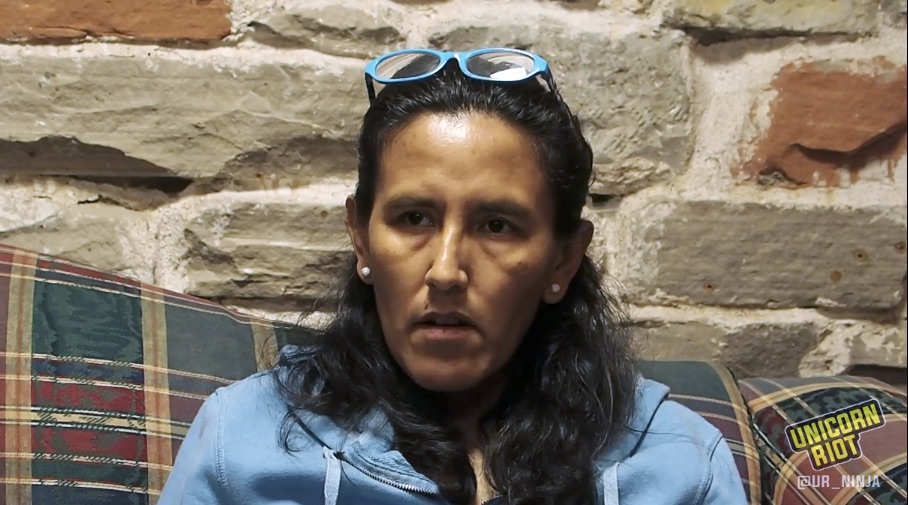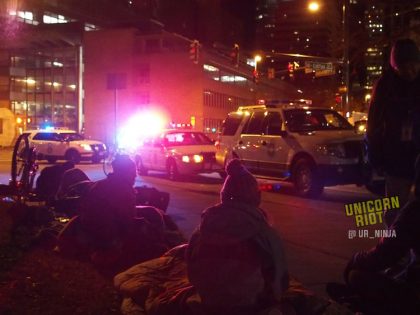Jeanette Vizguerra Named One of Time’s 100 Most Influential People as She Remains in Sanctuary
Denver, CO — On February 15, 2017, Jeanette Vizguerra, an undocumented mother and immigrant rights activist, entered into sanctuary at the First Unitarian Society in Denver.
Vizguerra decided to skip a scheduled check-in with her Immigration and Customs Enforcement (ICE) Officer because she had a strong feeling that her stay of living in the United States would be denied.
Her feeling turned out to be correct because later that day, her lawyer informed her that her stay had indeed been denied, and therefore her deportation was looming.
Vizguerra, who has been living and working in Denver for over 20 years, has three children who were born in the United States and one child born in Mexico. Even so, since that Wednesday, she has been living on the church grounds 24 hours a day, 7 days a week, while her children remain at home.
On Thursday, April 20, 2017, Vizguerra was revealed as one of Time Magazine’s “100 Most Influential People” of 2017.
Although she is influential and well-known internationally for her activism, her experiences as an undocumented immigrant in the United States are all-too-common.
But, we came here, it was a lot of work. When you start out in a different place, you start from zero. But from the first year, when [my husband and I] started working, the IRS assigns you an ITIN number (Individual Taxpayer Identification Number), which is for paying taxes, and is not a social security number for you to use to work. But it is for you to declare your taxes.
This department is part of the government, the IRS, and if you are given this number, it is because they know that you are undocumented. It doesn’t matter where you are from, you’re undocumented. They don’t want undocumented people here, but they want our money.”
Jeanette Vizguerra
In fact, the estimated collective tax payments of all undocumented immigrants in this country is $11.74 billion a year in state and local taxes.
On top of those billions in revenue, the U.S. Congress passed a law in 2007 which requires ICE to maintain at least 34,000 detention beds at any given time in order to receive $2 billion a year in federal funding.
In 2012, 90 percent of the beds in the 21 largest detention facilities — including the center in Aurora, CO — were administered by private prison operators, and in 2016, at least 70 percent of immigrant detainees in the U.S. were held in facilities that were owned or operated by private prison corporations.
Vizguerra is not the only individual living in sanctuary in Denver. On December 7, 2016, Ingrid Encalada Latorre claimed sanctuary at University Park’s Mountain View Friends Meeting, which makes her sanctuary stay over four months long.
In the Colorado immigrant community, there are many who are facing detention and/or deportation, including Maria de Jesus Jimenez Sanchez, who has lived and worked in Colorado for almost 20 years. She was detained about a week ago and was sent to the El Paso Processing Center in Texas where she faces deportation.
Gustavo Garcia Noriega is at risk for detention and deportation back to Mexico. His previous stay of deportation has expired and ICE has scheduled him to check in on Wednesday, April 26, 2017. The American Friends Service Committee (AFSC) and Coloradans For Immigrant Rights have organized a rally, at his request, outside of the building where he must check in.
Many undocumented immigrants across the country are now at higher risk of detention and deportation since Trump was elected. Not even three weeks after he was sworn in, nearly 700 undocumented immigrants were detained. On April 17, Juan Manuel Montes, a “DREAMer” who was protected under the Deferred Action for Childhood Arrivals (DACA), was deported. He is the first case of a DREAMer with protected status to be deported. Homeland Security originally stated that his status had expired in 2015, however has since confirmed that he was under protected status until 2018.
Below is our interview video with Vizguerra from February 18, 2017. She talks about why she and her family had to migrate from Mexico to the United States, and about crossing the border twice. She also analyzes and illuminates the United States’ immigration policies and system.
Watch the video on Vimeo or on YouTube.
To help our volunteer-operated, horizontally-organized, nonprofit media collective please consider a tax-deductible donation:
Unicorn Riot's Coverage of the Sanctuary Movement and U.S. Immigration:
- Vigil at GEO ICE Detention Center in Aurora Spreads Love to Immigrants (February 10, 2025)
- Coloradans Rally at State Capitol to Support Immigrants and Protest Mass Deportations (February 8, 2025)
- University of Utah Students Protest Against ICE and Police on Campus (February 6, 2025)
- Calls For a Migrant Labor Strike Grow on Social Media (December 28, 2024)
- ICE is Training Civilians to Conduct Violent Raids on Immigrants (October 31, 2024)
- Nearly 100 Migrant Families Evicted from Aurora, CO ‘Slumlord’ Apartments (August 13, 2024)
- Dozens of Migrant Families Face Eviction in Aurora, CO with Less Than One Week’s Notice (August 8, 2024)
- Protests Erupt Across Florida as Senate Bill 1718 Goes Into Effect (July 2, 2023)
- Protests Against Anti-Immigrant Laws to Continue (June 25, 2023)
- Minnesota ‘Driver’s Licenses For All’ Bill a National Model For Data Privacy Protections, Advocates Say (April 20, 2023)
- Eugenics, Border Wars & Population Control: The Tanton Network (August 22, 2022)
- Reports of Forced Sterilizations in ICE Facility Spark Protest (September 22, 2020)
- GEO Group’s ICE Jail Lies to Immigration Lawyer, Attempts Unlawful Deportation (July 2, 2020)
- Racial Justice Teach-in at Abolish ICE Camp in Aurora CO (June 13, 2020)
- Another Immigrant Claims Sanctuary from Deportation in Colorado (Feb. 14, 2020)
- Immigrant Rights Advocates Rally in Response to Rotten Food Given to Detainees (Jan. 6, 2020)
- Ingrid Encalada Latorre Pardoned After 2+ Years Claiming Sanctuary (Dec. 28, 2019)
- The Price to Oversee ICE: 200+ Protesters March in Aurora Suburb Home to GEO Group ICE Warden (Sep. 30, 2019)
- Twin Cities Jewish Community Blockades ICE Building, 27 Cited (Aug. 2, 2019)
- Passions Run High at ‘Close the Concentration Camps’ Protest (July 22, 2019)
- Hundreds in CO Plan Rally to ‘Close the Concentration Camps’ (July 12, 2019)
- Thousands March in Minneapolis to Stop Separating Families (June 30, 2019)
- Jeanette Vizguerra’s U-Visa Denied While in Sanctuary Second Time (June 27, 2019)
- CO Community Gathers Outside GEO ICE Facility on Longest Day of Year (June 21, 2019)
- Occupy ICE Denver Camps Outside GEO ICE Detention Center (Oct. 29, 2018)
- #OccupyICE Movement Grows Momentum in Colorado (Aug. 6, 2018)
- ICE Occupation Emerges at Denver Field Office (July 30, 2018)
- Philadelphia Reduces Police Help To ICE; ‘Occupy ICE’ Camp Moves (July 30, 2018)
- Protesters Occupy Philadelphia ICE Office (July 2, 2018)
- Protests Target ICE Contractor General Dynamics (June 29, 2018)
- Ninth Annual CO Love Knows No Borders, No Walls Vigil (Feb. 5, 2018)
- November Vigil at GEO Group ICE Detention Center in CO (Nov. 6, 2017)
- Ingrid Encalada Latorre Returns to Sanctuary; Four Claim Sanctuary in CO (Oct. 27, 2017)
- Ingrid Encalada Latorre Leaves Sanctuary After Six Months; Granted Temporary Stay (May 27, 2017)
- Indonesian Undocumented Immigrant Detained at ICE Check-In (May 24, 2017)
- Jeanette Vizguerra, Among Others, Celebrate Victories Against ICE Deportation Attempts (May 17, 2017)
- Sanctuary Movement Leader, Arturo Hernandez Garcia, Detained by ICE While at Work (April 30, 2017)
- Jeanette Vizguerra Named One of Time’s 100 Most Influential People as She Remains in Sanctuary (April 22, 2017)
- Crisis: Borderlands (March 14, 2017)
- Arizona Anti-ICE Demo Meets Arrests and Chemical Agents (Feb. 17, 2017)
- Deportations Begin Under Trump’s Regime (Feb. 14, 2017)
- Love Knows No BAN No Walls Vigil at GEO ICE Detention Center (Feb. 8, 2017)
Check out our short documentary on immigration and the border crisis:
- Crisis: Borderlands (March 14, 2017)



